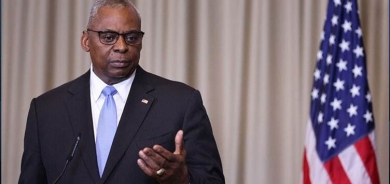Deadly blasts aimed at wrecking Annan’s peace efforts: Syria

“Yesterday’s explosions were carried out by terrorists supported by foreign powers which finance and arm them,” charged Al-Baath newspaper, mouthpiece of Syria’s ruling party of the same name.
“The two attacks... aim to disrupt Annan’s mission and to foil international efforts to find a political solution to the crisis,” it said, referring to U.N.-Arab League peace envoy Kofi Annan.
the two huge blasts killed at least 27 people and wounded 140 others in the heart of Syria’s capital on Saturday, the interior ministry said, blaming “terrorists” for the attacks.
The early morning explosions struck the heavily fortified air force intelligence building and the criminal security department, several miles apart in Damascus, at approximately the same time. Much of the facade of the intelligence building appeared to have been ripped away.
State-run news agency SANA said a third blast went off near a military bus at the Palestinian refugee camp Yarmouk in Damascus, killing the two suicide bombers.
Opposition activists blamed the regime, as in past lethal bomb attacks in the capital and the northern city of Aleppo.
Ath-Thawra, another official daily, pointed the finger at Qatar and Saudi Arabia which have called for rebels fighting the regime of Syrian President Bashar al-Assad to be armed.
Saudi Arabia has denied the accusations of arming Syrian rebels.
Humanitarian impact
Technical experts from the United Nations and the Organization of Islamic Cooperation (OIC), meanwhile, were to take part in a mission to assess the humanitarian impact of the crackdown on anti-regime protests since March 2011.
U.N. humanitarian chief Valerie Amos, who held talks in Damascus earlier this month, said the experts would join the assessment mission to Daraa, Homs, Hama, Tartus, Latakia, Aleppo, Deir Ezzor and rural zones around Damascus.
The U.N. and OIC staff would “accompany the mission and take the opportunity to gather information on the overall humanitarian situation and observe first-hand the conditions in various towns and cities,” she said.
The United Nations estimates more than 30,000 Syrians have fled to neighboring states and another 200,000 have been displaced within the country by the past 12 months of deadly violence.
Also on Saturday, two “terrorists” were killed as a booby-trapped car they were driving blew up in a Palestinian refugee camp in a suburb of Damascus, Syria’s state news agency SANA reported.
On Friday, international envoy Annan warned of a regional “escalation” of the Syria conflict which activists says has cost more than 9,100 lives and urged the U.N. Security Council to close ranks to put pressure on Assad.
The former United Nations chief, who met Assad in Damascus last weekend, has ordered a team of experts to Syria to discuss a possible ceasefire and international monitoring mission, his spokesman said.
Annan’s team are to head to Damascus from New York and Geneva on Monday, his spokesman said.
Al-Qaeda
Bombings have hit Syria’s major cities in recent months, provoking mounting concern that al-Qaeda has taken advantage of the uprising against Assad.
Top U.S. intelligence officials have pointed to al-Qaeda in Iraq as the likely culprit behind the previous bombings, raising the possibility its fighters are infiltrating across the border to take advantage of the turmoil.
Al-Qaeda’s leader called for Assad’s ouster in February.
A previously unknown Islamist group calling itself Al-Nusra Front to Protect the Levant claimed responsibility for the previous attacks in a video posted online, saying it carried them out “to avenge the people of Homs.” Homs is an opposition stronghold in central Syria that has been hard-hit in the government crackdown.
The blasts also questions about how suicide car bombers were able to penetrate high-security areas in Damascus. Since the first suicide bombings struck the capital in December, the government has taken exceptional measures around state security and other government institutions and ministries, putting up thick concrete blast walls and checkpoints and guards checking drivers' IDs.
Syria’s opposition, however, has accused the regime of stage-managing the attacks.
Bassma Kodmani, a Paris-based member of the opposition Syrian National Council, said she doubted the armed groups trying to bring Assad down by force, such as the rebel Free Syrian Army, have the capacity to carry out such attacks on security institutions in the capital.
“I don't think any of the opposition forces or the Free Syrian Army has the capacity to do such an operation to target these buildings because they are fortresses,” she said by telephone. “They are very well guarded. There is no way anyone can penetrate them without having strong support and complicity from inside the security apparatus.”
The rebel Free Syrian Army, the most powerful armed opposition force, has appealed for the international community to send weapons to help it fight the regime, but so far, no countries are heeding the call. The U.S. and others have not advocated arming the rebels, in part out of fear it would create an even more bloody and prolonged battle.
(Reuters)














